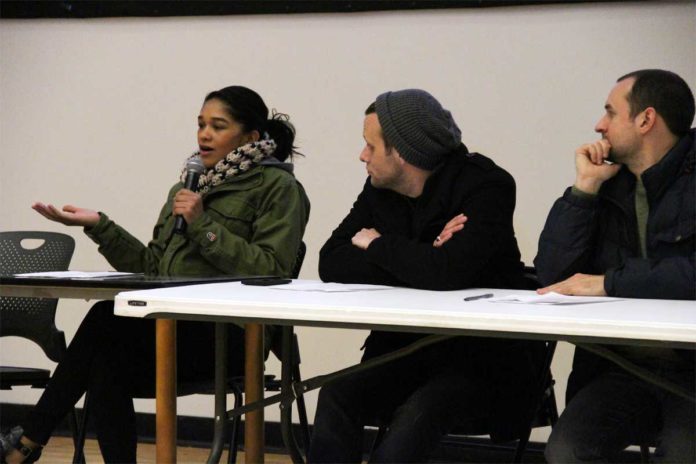SRU’s Student Union for Multicultural Affairs (SUMA) discussed how to recognize and advocate against everyday racism in their panel discussion on the documentary “Cracking the Codes: The System of Racial Inequity,” on Monday.
SUMA showed the movie at 6 p.m. in the Advanced Technology and Science Hall’s (ATS) auditorium, and used anecdotes and statistics to demonstrate racism and racial inequities in everyday life. Dr. Shakti Butler made the film, and said that she created it to initiate open conversations about race in everyday situations.
The system of inequities described in the film focused on internal and external factors on racism, which included bias, privilege, internalized racism, interpersonal, institutional and structural biases, all of which are driven by power and economics.
The film broke down the meaning of racial inequity, including the term “white privilege” which the film used to describe how white people have an inherent upper hand in their environment because society is more accepting of them.
After the movie, the host of the event, and senior philosophy and psychology major, Qaadir Anderson-Perry, 22, led the panel of students and professors in a discussion about the movie. Attendees were also able to participate in the discussion by raising their hands and responding, or by tweeting questions, and tagging SRU SUMA’s Twitter handle.
Panelist and associate athletic director, Torry Rollins said that black people have to continually adapt to different environments in order to be accepted by the rest of the world.
“The best thing my parents ever did for me was take me to work with them,” he said. “They made a conscious effort to allow me to see them in another setting, where they could react to other people.”
Senior business management major, Brittany Edwards, 21, said that the first step to combatting racism was to realize that it exists, and then work to change it.
“The most interesting thing I learned was that where you’re from dictates how good your education system is,” Edwards said. “If you’re educated on these inequities, you can make change happen.”
On the subject of white privilege, panelist, and senior psychology and philosophy major, Benjamin Zeiger, 22, noticed what he said was an instance of white privilege during the discussion, wherein all the white males at the panel were leaned forward on the table in what Zeiger described as a “claim of territory.”
“It isn’t enough that I put myself in someone else’s shoes,” Zeiger said. “Being a white male, I have inherent privileges that others don’t. It’s up to me to use my societal advantage to help and understand others’ struggles.”
Audience member, and junior criminology major, Na’Jae Tate, 21, said that the documentary was empowering, and was very fair on how it presented racial inequity.
“White privilege is out there whether we like it or not,” Tate said, “but the video taught people to use their privilege to advocate for those who don’t have it, and I think that’s a great message.”
Anthropology professor, and panelist, Dr. Aksel Casson, said that the video’s greatest strength was that it took real experiences from real people, which he said resonated with the audience.
“Just like we’re using social media here,” Casson said, “Don’t just use it to communicate with your friends, but to share in experiences that are different than yours.
Audience member, and senior psychology major, Troy Clark, 22, said that she went to the presentation to see others’ perspectives on racial division.
“The best way to learn about others struggles is to educate yourself on all ethnicities, and be open to learning about people who are different than you,” Clark said.







